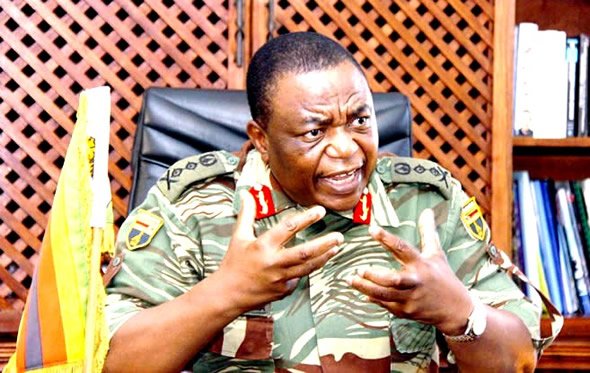The Zimbabwean military is deeply divided over what action to take against the two army generals who criticised their commander, General Constantine Chiwenga, describing him as a “political general” with “little practical military experience or expertise”.
![General Constantine Chiwenga (pictured) was described as a “political general” with “little practical military experience or expertise” by Major-General Fidelis Satuku and Brigadier-General Herbert Chingono.]()
- General Constantine Chiwenga (pictured) was described as a “political general” with “little practical military experience or expertise” by Major-General Fidelis Satuku and Brigadier-General Herbert Chingono.
Several meetings have been held at Zimbabwe Defence House and other places, with top army officials expressing different views on how the military should deal with Brigadier-Generals Herbert Chingono and Fidelis Satuku, who are currently under investigation for sneering at their boss at secret meetings with top United States diplomats.
According to leaked cables, Chingono and Satuku spoke to US Ambassador Charles Ray last year about Chiwenga’s political ambitions, different views and opinions within the army, conditions of service, sanctions and politics. Whereas the cables refer to Satuku as “Major-General”, the Zimbabwe Independent this week verified that he is actually a Brigadier-General.
Although it is generally accepted among the commanders that it was wrong for Satuku and Chingono to meet with US diplomats, whom Mugabe considers enemies of the state, the two have the backing of some senior army officers who think the issue must be allowed to pass.
Top military sources said while some army commanders like Chiwenga and his clique want action against Chingono and Satuku, there were others who were strongly opposed to that, preferring to be cautious.
Those opposed argue the army must follow President Robert Mugabe’s lead on the issue. Mugabe has reportedly chosen not to act on senior party officials implicated in the WikiLeaks disclosures.
Besides the sympathisers in the military, Chingono and Satuku also have backers in the Zanu PF politburo who strongly believe that they should not be punished for meeting with the diplomats.
A top politburo member questioned why Chiwenga was so quick to institute an investigation when his boss had decided to ignore the cables.
“Why are they investigating the two? We in the party are not doing anything about it and I don’t expect us to discuss the cables in future meetings,” the politburo member said.
“The president is not going to deal with the matter, so why should he? He should leave them alone.”
These views have also been expressed by some commanders at their meetings who have said the military should take a cue from the president so that they are not at variance with politicians.
Sources told the Independent that officials opposed to court-martialling the two generals have pointed out that it was unwise to act now when they did not know to what the extent of the WikiLeaks impact was on the military, their veracity and who else might be implicated.
If after investigation Chingono and Satuku have a case to answer, according to the Defence Act, they will be court-martialled and could face imprisonment if convicted or even a death sentence, although that is unlikely.
Army spokesperson Colonel Overson Mugwizi confirmed last week that the two army generals were currently under investigation. Military sources said Chingono and Satuku could be charged with “treason or subversion” for secretly meeting Ray in January last year to discuss Zimbabwe’s “sensitive military issues” and politics in contravention of the Defence Forces Act, their code of conduct and ethics.
In 1999, Chingono, an artillery officer, was the last Zimbabwe National Army commander to train at the United States National Defence University under the International Military Education and Training programme, while Satuku received his military training in Britain. Zimbabwe Independent






